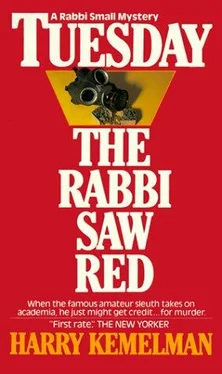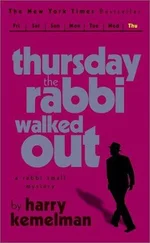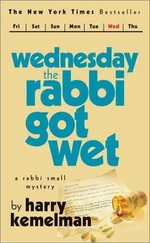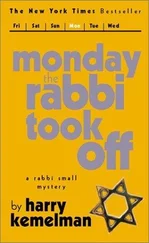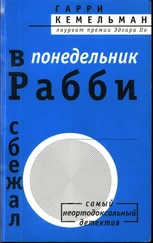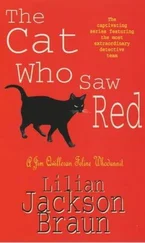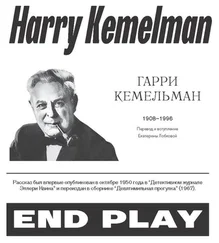"Well, it's a relief to know that I'm not a suspect." said the rabbi, "even though it never occurred to me that I ever was. But you said you began to suspect Roger Fine in the course of checking me out."
"That's right. You got us to thinking about how that statue could have fallen, now that we were quite certain it had not been jarred loose by the bomb. It could be knocked down by somebody climbing up there, like you, but it's not too likely. It's pretty heavy, for one thing, sixty-two pounds, seven ounces, not easily toppled by a sideswipe of the hand, and Hendryx wouldn't just sit there watching."
"It's what occurred to me when you first suggested it." said the rabbi, "my preparation for the defense, you might say." Ames nodded. "So what would knock it down? We cemented the shards together and experimented with it. You couldn't do it with a stick— no leverage. If you had a long pole, like a window pole, you could insinuate it behind the statue and then pull, that would do it, but it would fall to one side. But if you had a stick with a hook on the end—"
"A stick with a hook?"
"Like a cane, then it's child's play. You just reach around with the handle of the cane and pull. So there you have opportunity: he was in the building at the time, and weapon—"
"But the statue was the weapon and anyone could have used it." the rabbi objected. Ames shook his head. "It was there all right, but only a man with a cane could have used it. Professor Fine is the only man in the school who has a cane with him all the time."
The rabbi was silent for a moment and then asked quietly, "And motive? What was his motive?" Ames waved a hand in airy dismissal. "Who knows what really motivates a man? Frequently he doesn't know himself, we can only surmise or guess-until he confesses, we know they had quarrelled, that Fine considered him an anti-Semite—"
"He made sly little digs, an occasional joke, nothing that would justify anything more than a sharp rejoinder." said the rabbi. "From you. But Professor Fine is a much younger man. Still. I'll go along with you, not enough motive for murder. But then we picked up this Ekko, the fifth member of that student committee, and after a while he talked, and it turned out that Professor Fine had opposed that meeting with the dean and even had opposed the student campaign to make the school change its mind about dropping him."
"But why?" asked the rabbi.
"Exactly," said Ames. "That's what we couldn't understand. Until Ekko revealed something Fine had told him in confidence. You see, at the end of the summer session. Professor Fine leaked the final exam to one of the students, Hendryx found out about it and reported it."
"Fine admits this?"
"In writing. Rabbi, in writing." said Ames. "His written confession was in the safe in the dean's office. It was an earnest that he would not make trouble if they let him continue to the end of his contract."
"And Ekko tried to blow up the safe to destroy it?"
"No, no," Ames said hastily. "That's what we thought at first. But it turns out he had nothing to do with the bombing, nothing at all."
The rabbi waited to hear who in fact was responsible for the bombing, but when he saw Ames was not about to amplify his remark, he said: "Surely you're not suggesting that Fine killed Hendryx because he reported him to the dean?"
"It gives him a motive." Ames pointed out.
"You say that all happened last summer, he certainly seems to have taken his time about it." remarked the rabbi dryly.
"Sometimes these things smoulder." Ames said.
"And they usually continue to smoulder until the resentment dies out and is forgotten." said the rabbi.
"But suppose something happened the day of the murder that was quite capable of puffing it into flame?" suggested Ames. "What if something happened that made it look as though Fine might never get another teaching job? How do you think Fine would feel about that?"
"What was that?" asked the rabbi.
"Well, I'll admit I don't know too much about college hiring practices." Ames said lazily, "but I'd guess that while references from an acting head might not be necessary, since his function is purely administrative, one from the permanent head of the department is, and the very day of the murder. Rabbi, Hendryx was made head of the English department!"
The rabbi pursed his lips. "Hendryx didn't mention it to me."
"He wouldn't be likely to since it had not been officially announced. President Macomber told the dean not to say anything until the board met and made it official."
"Then how could Fine know of it?"
"Ah, my guess is that Hendryx told him." He looked at the rabbi, obviously enjoying his puzzlement. "You see, Hendryx and Betty, the president's daughter, were going to be married and she got her father to make the appointment." He chuckled. "Dean Hanbury had been campaigning for the appointment right along without success, but then a daughter, an only daughter, carries more clout. I imagine. I can see how Macomber would find it hard to refuse her."
The rabbi still didn't see how that involved Fine. "
Oh come. Rabbi, use a little imagination. Remember, this Ekko has told us Fine was against the student campaign on his behalf because he has promised the dean, and presumably Hendryx, he will not make trouble, and here's a committee coming to present a petition in his behalf that very afternoon. So with the dean tied up. Fine goes up to Hendryx's office to assure him the committee was not his idea. I can imagine Hendryx, who's heard of his appointment the night before from Betty Macomber, leaning back in that way you've described and relishing the situation to the hilt. I can imagine him taking a certain sadistic pleasure in informing the young man that now he was the regular head of the department, and that Fine was not to expect any letter of recommendation from him, perhaps he'd even better begin thinking of going into another line of work."
"Perhaps." said the rabbi. "It seems that the motive is mostly your imagination."
"You're not speaking objectively there. Rabbi," Ames said reproachfully. "You're speaking like the attorney for the defense. It's not time for that yet."
"All right, go on. Or is that all of it? How about the alibi? Have you worked out how Fine could have got into Hendryx's apartment?" Ames beamed. "I'm rather pleased with myself on that score. I questioned the cleaning woman again, and it seems it was her custom to leave the door unlatched while she went in and out, emptying wastebaskets and things, she simply forgot to reset the latch when she left. Quite characteristic of cleaning women. I assure you."
"But how would Fine know that? Or is it your theory that he just took pot luck?"
"Ah, we have evidence from other people in the department that Hendryx was always complaining about his cleaning woman, about the way she always left the door unlocked, among other things."
The rabbi was silent and Ames waited a few seconds before going on. "So there we have it: opportunity, motive, weapon— the last peculiar to the accused. So we picked Fine up and questioned him, he denied everything, of course, and refused to give an account of his actions for that afternoon."
"He's within his rights, isn't he?" asked the rabbi. "Of course. But why should he refuse? If he has an alibi, he has only to tell us, we'd check it out, and if it stands up we'd release him. But if it's not a very good alibi, a rigged alibi, say, that he intends to spring on us at the trial so that we couldn't check it out in advance— and that sort of thing might occur to a smart young man like Fine— well, Rabbi, you'd be doing him a favor to convince him of his folly. Because we'd break that alibi, believe me. But the fact that he tried it could have a very serious effect on the judge and on the sentence. I’ve talked to Winston about it."
Читать дальше
